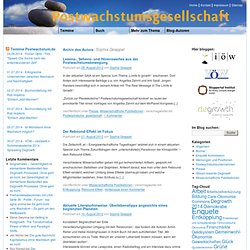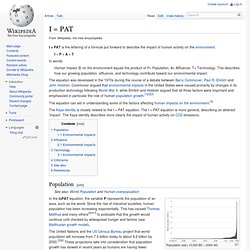

Blog – Postwachstum. Lesens-, Sehens- und Hörenswertes aus der Postwachstumsbewegung In der aktuellen GAIA ist ein Special zum Thema „Limits to growth“ erschienen.

Dort finden sich interessante Beiträge u.a. von Angelika Zahrnt und Irmi Seidl. Jorgen Randers beschäftigt sich in seinem Artikel mit “The Real Message of The Limits to Growth”. „Zurück zur Pferdekutsche? Postwachstumsgesellschaft konkret“ so lautet der provokante Titel eines Vortrages von Angelika Zahrnt auf dem McPlanet Kongress [...] Der Rebound-Effekt im Fokus Die Zeitschrift „et – Energiewirtschaftliche Tagesfragen“ widmet sich in einem aktuellen Special zum Thema Zukunftsfragen dem „unterschätzte[n] Paradoxon der Klimapolitik“ – dem Rebound-Effekt.
Verschiedene Wissenschaftler geben mit gut recherchierten Artikeln, gespickt mit anschaulichen Statistiken und Graphiken, Antwort darauf, was man unter dem Rebound-Effekt versteht, welchen Umfang diese Effekte überhaupt haben und welche Möglichkeiten bestehen, ihren Einfluss zu [...] Presseschau. Supperclubbing - your social dining network. Foundation for Ecological Security - Get Involved. Our mandate, the work that we do and the locations we work in require people from diverse backgrounds. A sensitivity and concern for nature and the lives of the rural poor and the ability to work with a larger group in difficult terrain are a must for anyone interested in joining us. We have a strength of around 200 people, many of whom are post graduates with a varied academic background such as social sciences, rural management, forestry, and agriculture from premier development institutes such as the Institute of Rural Management, Anand; Institute of Forest Management, Bhopal; Tata Institute of Social Sciences, Mumbai; the Xavier Institute of Social Service, Ranchi and Forest Research Institute, Dehradun.
We see ourselves as an organization that nurtures the interests of its staff, encourages the building of new skills and provides opportunities for training and further learning in an individual’s area of interest. I = PAT. In words: Human Impact (I) on the environment equals the product of P= Population, A= Affluence, T= Technology.

This describes how our growing population, affluence, and technology contribute toward our environmental impact. The equation was developed in the 1970s during the course of a debate between Barry Commoner, Paul R. Ehrlich and John Holdren. Commoner argued that environmental impacts in the United States were caused primarily by changes in its production technology following World War II, while Ehrlich and Holdren argued that all three factors were important and emphasized in particular the role of human population growth.[1][2][3] The equation can aid in understanding some of the factors affecting human impacts on the environment.[4] The Kaya identity is closely related to the I = PAT equation. Population[edit] Population (est.) 10,000 BC – 2000 AD.
News & events - Geosciences.
Textbook. Overconsumption. CO2 emission per capita per year per country pre-2006 The theory was coined to augment the discussion of overpopulation, which reflects issues of carrying capacity without taking into account per capita consumption, by which developing nations are evaluated to consume more than their land can support. Green parties and the ecology movement often argue that consumption per person, or ecological footprint, is typically lower in poor than in rich nations.
Causes[edit] Planned obsolescence[edit] Planned obsolescence is, by definition: "a method of stimulating consumer demand by designing products that wear out or become outmoded after limited use. " Effects[edit] The scale of modern life's overconsumption has enabled an overclass to exist, displaying affluenza and obesity. In the long term these effects can lead to increased conflict over dwindling resources [2] and in the worst case a Malthusian catastrophe.
Economic growth[edit] [edit] Counteractions[edit] Overconsumption in the USA[edit] Hans Rosling's 200 Countries, 200 Years, 4 Minutes - The Joy of Stats - BBC Four.